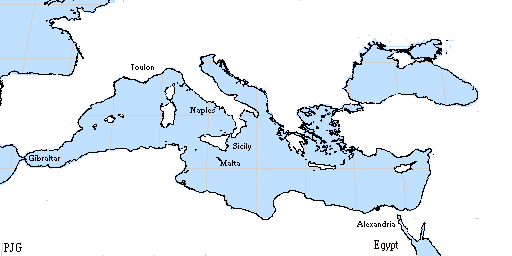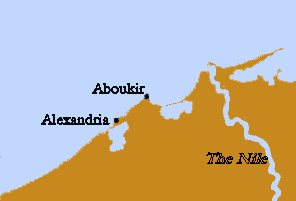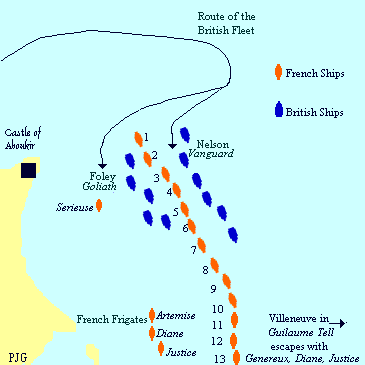
In 1798 the French Revolutionary general Napoleon Bonaparte planned an invasion of Egypt, in order to constrict
Britain's trade routes and threaten its possession of India. The British government heard that a large French naval expedition
was to sail from a French Mediterranean port under the command of Napoleon, and in response it ordered the Earl of St.
Vincent, the commander in chief of the British Mediterranean fleet, to detach ships under Rear Admiral Sir Horatio Nelson to reconnoitre off
Toulon and to watch French naval movements there. But Nelson's own ship was dismasted in a storm, and his group of
frigates, now dispersed, returned to the British base at Gibraltar. Meanwhile, St. Vincent sent Nelson more ships, which
joined Nelson on June 7, bringing his strength up to 14 ships of the line.
The French expedition eluded the British warships and sailed first for Malta, where the French seized control early in
June. After spending a week at Malta, Napoleon sailed with his fleet for his main objective, Egypt. Meanwhile, Nelson had
found Toulon empty and had correctly guessed the French objective, (which he outlines in a letter(opens in a new window) to George Baldwin the British Consul in Alexandria), but because he lacked frigates for reconnaissance, he
missed the French fleet, reached Egypt first, found the port of Alexandria empty, except for Turkish ships and returned to Sicily, where his
ships were resupplied. Nelsons letters and dispatches give a good idea of his frustration at cruising the Mediterranean in search of the French fleet.
Letters and Dispatches of Horatio Nelson.(opens in a new window)
Determined to find the French fleet, he sailed to Egypt once more, and on August 1 the main
French fleet of 13 ships of the line and 4 frigates, under Admiral Fran�ois-Paul Brueys d'Aigailliers, was sighted at anchor in Abu Qir Bay.


|
|
|
British Line of Battle.
|
. The British ships anchored as they came alongside the French. With the wind behind them they could pick their positions, and the French ships at the rear of the line could do nothing to help. The French frigate Serieuse made the mistake of firing at the Goliath, a broadside from the Orion left her shattered and sinking. Captain Miller of the Theseus took advantage of the French gunners firing high and moved his ship closer, rightly guessing that in the heat of the battle they would fail to lower the elevations of their guns. On the seaward side of the French line Nelson took Vanguard and anchored alongside Spartiate. The five leading French ships were between the fires of five British ships to larboard and three to starboard. .
As night was falling Bellerophon positioned herself alongside the massive French flagship, the three decker, 120 gun Orient. Bellerophon got the worst of the exchange, was dismasted and drifted out of the action, it was about 8 pm. As the last British ships came into action some managed to exploit gaps opening in the French line and anchor between the French ships, protecting themselves from enemy broadsides and at the same time allowing them to rake the French. The 50 gun ship Leander saved herslf in this way . |
Temporarily the firing ceased. But slowly, as the crews recovered, firing began again, although at a lesser rate after six hours of continuous battle.
As the night wore on those ships still in French hands had made their way downwind, to the eastern end of the bay. As dawn broke these ships engaged the nearest British ships, the Alexander and the Majestic. The Theseus and the Goliath came to their aid. The Artemise crew surrundered their ship and then set fire to it, escaping to the shore in the ships boats. She blew up later in the day. The Heureux and the Mercure ran aground and, after a brief exchange of fire with Goliath, Theseus, Alexander and Leander they surrendered.
At about 6 am the remaining French ships were not being engaged, the Tonnant was a shattered hulk and the Timoleon ran aground whilst trying to tack. Rear Admiral Villeneuve was left with the Genereux and his own Guillaume Tell, plus the frigates Diane and Justice. There was a clear passage to the sea and Villeneuve took it. They were pursued by the Zealous, but she was recalled by Nelson, as none of the other British ships were in a position to support her.
As a final point on the command of the British fleet, it may be noted that Nelson had barely recovered from the loss of his right arm, sustained during the unsuccesful attack on Tenerife the previous year. And he had just been involved in a dishonourable campaign against the Neapolitan rebels. The victory at the Nile helped to raise Nelsons popularity further at home, and to cement his reputation in the navy, as one of the most able commanders of his generation. He was wounded again during this battle, a bullet or splinter gashed opened his forehead, blinding him with blood and at first feared he would die. He was later helped back on deck to watch the latter stages of the battle.
So why was the battle lost by the French?
D'brueys had not ensured that the line of French ships was close enough to shallow water to prevent the British from getting inside his line. He had forseen circumstances where the van or middle of the line could give support to the rear, but he had not placed any orders for the rear to come to the aid of the van, a manouevre he knew to be impossible with the wind blowing down the line. This allowed the British ships to roll up the line, concentrating fire on individual ships with no chance of support from their comrades. He had probably thought the British would not attack as night fell, so his ships were not well prepared, the decks were still covered with crates of supplies, hampering the gun crews. In the end all these factors meant annhilation for the French fleet.
Historians debate the consequences of Nelsons victory at the Nile to this day. Although the French fleet was destroyed, Bonaparts army was still loose in Egypt, although cut off from further supplies. So the aim of preventing any threat to India did not succeed. However all events in history have consequences, like ripples spreading in a pond. The third in command of the French fleet was Admiral Villeneuve, who was later to meet Nelson again at the Battle of Trafalgar. In 1805 Villeneuves' prime mission had been to secure French naval supremacy in the English Channel, if only for a few days. Perhaps the thought of the total defeat of the fleet he was with in 1798 at the Nile made him more cautious than he might have been. Instead of sailing for the Channel he sailed to Cadiz and ultimately defeat at the Battle of Trafalgar.
This site is run by the US Naval Institute and they have produced an interactive Battle of the Nile CD.
HORATIO NELSON - Vanguard, off the Mouth of the Nile, 3rd August, 1798
A RETURN OF THE KILLED AND WOUNDED IN HIS MAJESTY'S SHIPS, UNDER THE COMMAND OF SIR HORATIO NELSON, K.B., REAR-ADMIRAL OF THE BLUE, ETC. IN ACTION WITH THE FRENCH, AT ANCHOR, ON THE 1ST OF AUGUST, 1798, OFF THE MOUTH OF THE NILE.
Theseus.—5 Seamen killed; 1 Officer, 24 Seamen, 5 Marines wounded. —Total 35.
Alexander.—1 Officer, 13 Seamen killed; 5 Officers, 48 Seamen, 5 Marines , wounded.—Total 72.
Vanguard.—3 Officers, 20 Seamen, 7 Marines, killed; 7 Officers, 60 Seamen, 8 Marines, wounded.—Total 105.
Minotaur.—2 Officers, 18 Seamen, 3 Marines, killed, 4 Officers, 54 Seamen, 6 Marines, wounded.—Total 87.
Swiftsure.—7 Seamen killed; 1 Officer, 1 9 Seamen, 2 Marines, wounded.—Total 29.
Audacious.—1 Seaman killed; 2 Officers, 31 Seamen, 2 Marines, wounded.—Total 36.
Defence.—3 Seamen, 1 Marine, killed; 9 Seamen, 2 Marines, wounded.—Total 15.
Zealous.—1 Seaman killed; 7 Seamen wounded.—Total 8.
Orion.—1 Officer, 11 Seamen, 1 Marine killed; 5 Officers, 18 Seamen, 6 Marines, wounded.—Total 42.
Goliath.—2 Officers, 12 Seamen, 7 Marines, killed; 4 Officers, 28 Seamen, 9 Marines, wounded.—Total 62.
Majestic.—3 Officers, 33 Seamen, 14 Marines, killed; 3 Officers, 124 Seamen, 16 Marines, wounded.—Total 193.
Bellerophon.—4 Officers, 32 Seamen, 13 Marines, killed; 5 Officers, 126 Seamen, 17 Marines, wounded.—Total 197.
Leander.—14 Seamen wounded.
Total.—16 Officers, 156 Seamen, 46 Marines, killed; 37 Officers, 562 Seamen, 78 Marines wounded.—Total, 895.
OFFICERS KILLED.
Vanguard.—Captain William Faddy, Marines; Mr. Thomas Seymour, Mr. John G. Taylor, Midshipmen.
Alexander.—Mr. John Collins, Lieutenant.
Orion.—Mr. Baird, Captain's Clerk.
Goliath.—Mr. William Davies, Master's Mate; Mr. Andrew Brown, Midshipman.
Majestic.—George B. Westcott, Esq. Captain; Mr. Zebedee Ford, Midshipman; Mr. Andrew Gilmour, Boatswain.
Bellerophon.—Mr. Robert Savage Daniel, Mr. Philip Watson Launder, Mr. George Joliffe, Lieutenants; Mr. Thomas Ellison, Master's Mate.
Minotaur.—Lieutenant John S. Kirchner, Marines; Mr. Peter Walters, Master's Mate.
OFFICERS WOUNDED.
Vanguard.—Mr. Nathaniel Vassal, Mr. John M. Adye, Lieutenants; Mr. John Campbell, Admiral's Secretary; Mr. Michael Austin, Boatswain; Mr. John Weatherstone, Mr. George Antrim, Midshipmen. *(see note)
Theseus.—Lieutenant Hawkins.
Alexander.—Alexander J. Ball, Esq., Captain; Captain J. Cresswell, Marines; Mr. William Lawson, Master; Mr. George Bulley, Mr. Luke Anderson, Midshipmen.
Audacious.—Mr. John Jeans, Lieutenant; Mr. Christopher Font, Gunner.
Orion.—Sir James Saumarez, Captain; Mr. Peter Sadler, Boatswain; Mr. Philip Richardson, Mr. Charles Miell, Mr. Lanfesty, Midshipmen.
Goliath—Mr. William Wilkinson, Lieutenant; Mr. Lawrence Graves, Midshipman; Mr. Peter Strachan, Schoolmaster; Mr. James Payne, Midshipman.
Majestic.—Mr. Charles Seward, Mr. Charles Royle, Midshipmen; Mr. Robert Overton, Captain's Clerk.
Bellerophon.—H. D'E. Darby, Esq., Captain; Mr. Edward Kirby, Master; Captain John Hopkins, Marines; Mr. Chapman, Boatswain; Mr. Nicholas Bettson, Midshipman.
Minotaur.—Mr. Thomas Irwin, Lieutenant; Mr. John Jewell, Lieutenant Marines; Mr. Thomas Foxten, 2nd Master; Mr. Martin Wills, Midshipman.
Swiftsure.—Mr. William Smith, Midshipman.
* Nelson has not included his name in the list of wounded, despite receiving a head wound he at first feared would be fatal.